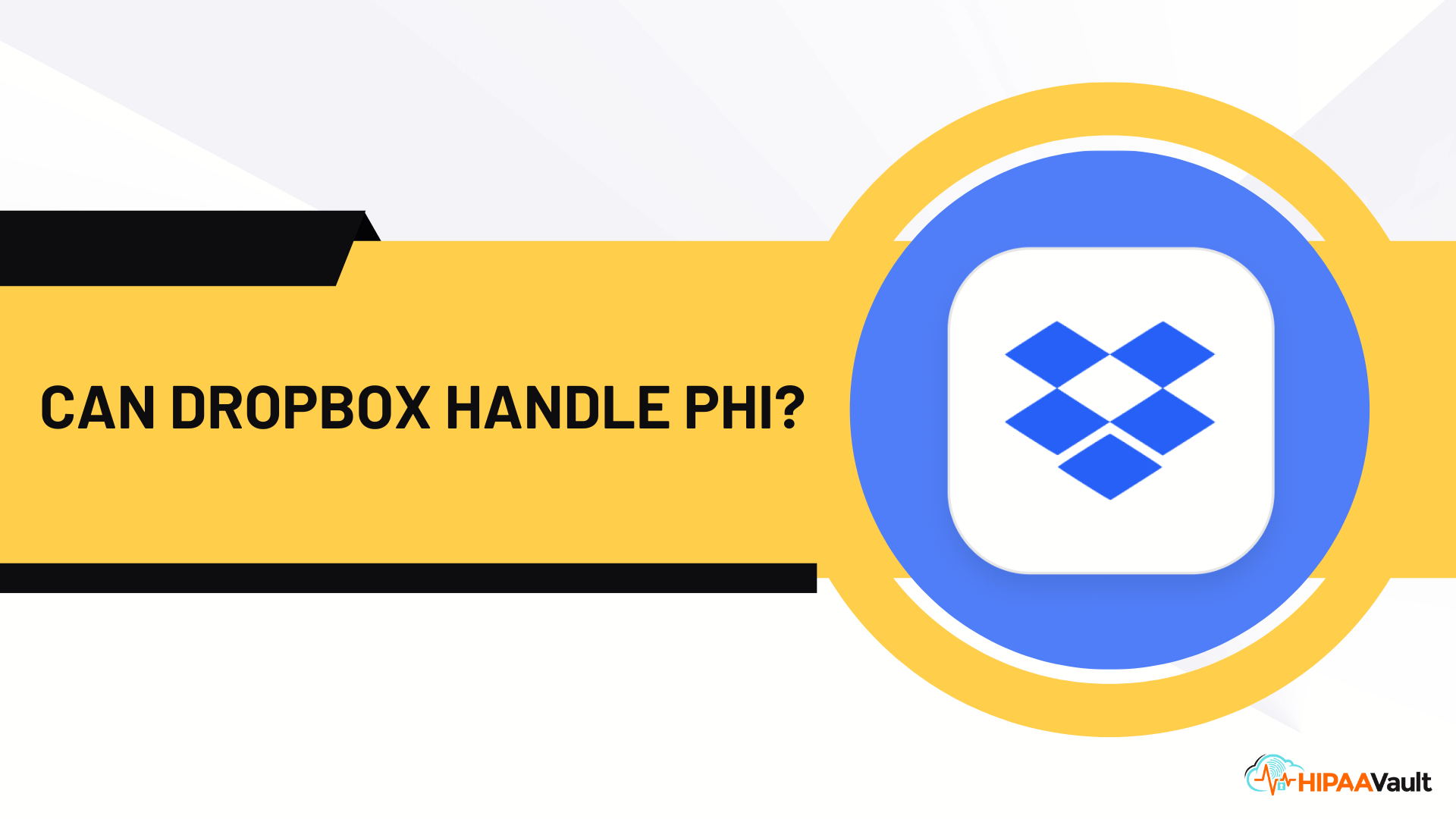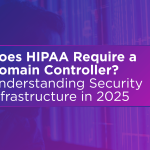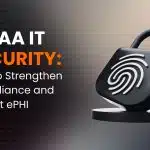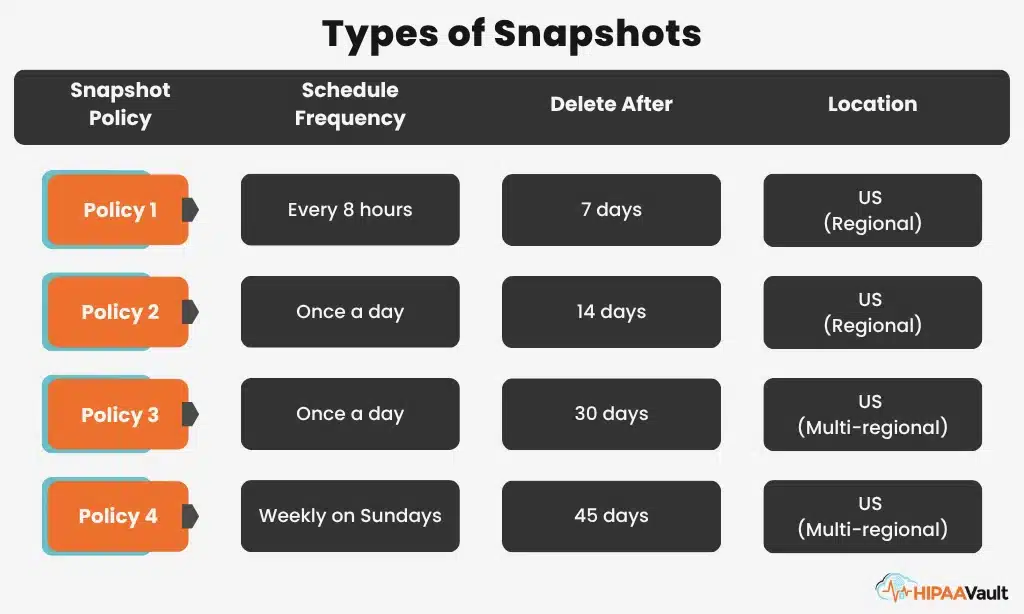Healthcare organizations continue to migrate workflows to the cloud, seeking convenience, collaboration, and cost savings. But when it comes to storing or sharing protected health information (PHI), not every platform is built to meet HIPAA’s strict standards.
One question we frequently hear from providers and IT teams is: Is Dropbox HIPAA compliant?
Let’s clarify what’s required, when Dropbox can meet those needs—and why many healthcare organizations choose a dedicated service like HIPAA Vault instead.
Need a HIPAA-compliant file sharing solution right now? → Talk to an expert
—
What Is Dropbox and How Is It Used in Healthcare?
Dropbox is a popular cloud storage tool used by businesses of all sizes for file syncing, storage, and collaboration. In healthcare, it’s occasionally adopted by smaller practices or individual providers for tasks like sharing intake forms, scanned documents, or referral files.
While Dropbox may be familiar and easy to use, its standard setup is not built for HIPAA by default. That matters when PHI is involved—because any platform used to store or transmit such data must meet the requirements of the HIPAA Privacy and Security Rules.
—
Secure Your Healthcare Operations with Full HIPAA Compliance
HIPAA Vault provides end-to-end compliance services — from secure hosting to expert risk assessments and 24/7 support.
Get a Free Compliance AssessmentIs Dropbox HIPAA Compliant?
Dropbox can be HIPAA compliant—but only under certain conditions.
Dropbox will sign a Business Associate Agreement (BAA) for customers on specific plans, such as Dropbox Business Advanced and Dropbox Enterprise. The BAA is a legal document that outlines the responsibilities of the platform when handling PHI, a requirement under the HIPAA Omnibus Rule.
Without a signed BAA, use of Dropbox for PHI storage or sharing is not permitted under HIPAA. Even with the agreement, organizations are still responsible for configuring Dropbox correctly, including applying access controls, enabling logging, and encrypting data.
Dropbox encrypts data in transit using TLS and at rest using AES-256-bit encryption, aligning with NIST standards. But compliance doesn’t stop at encryption. User management, audit logging, and proper permissions must also be maintained.
(Source: Dropbox HIPAA Compliance Guide – https://help.dropbox.com/accounts-billing/security/hipaa)
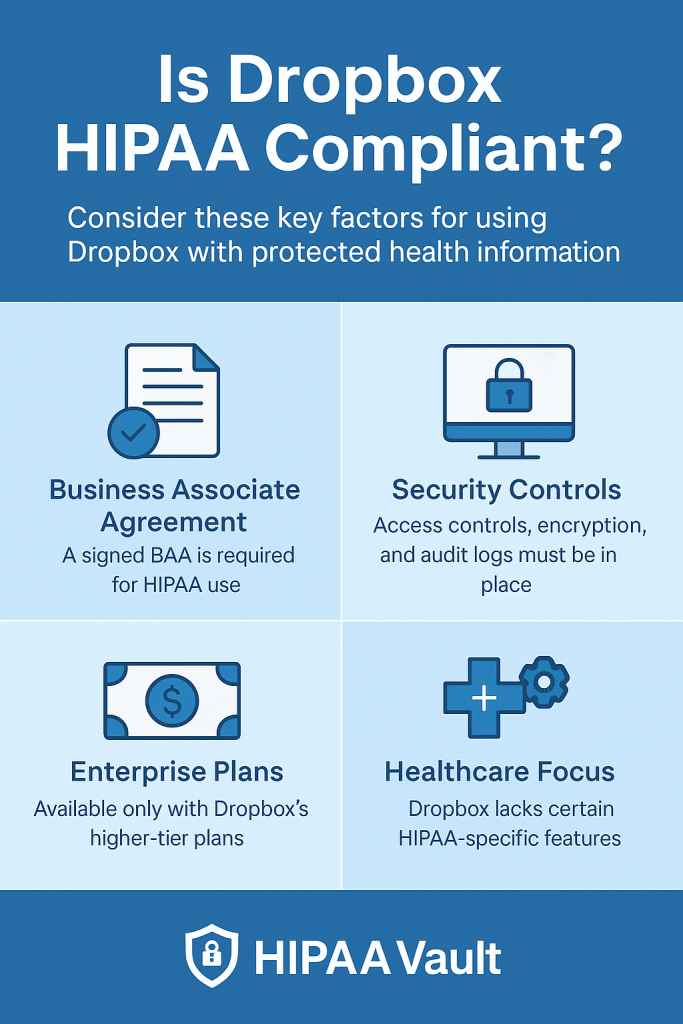
—
HIPAA File Sharing Requirements Explained
To safely store or transmit PHI, a cloud platform must meet several HIPAA-mandated technical and administrative safeguards.
This includes implementing strong encryption, both in transit and at rest. TLS 1.2+ should protect data during transfer, while AES-256 or equivalent protects it on the server. Access must be tightly controlled with individual user logins and multi-factor authentication.
Administrators must have visibility into user activity. That means full audit logging and retention of access records. And every vendor handling PHI must provide a signed BAA.
According to HHS, failure to meet these criteria can result in steep civil penalties—even if a data breach never occurs. (Source: https://www.hhs.gov/hipaa/for-professionals/security/guidance/index.html)
—
How to Use Dropbox Securely (And Where It Falls Short)
If you’re set on using Dropbox, it’s essential to upgrade to a plan that supports HIPAA compliance and ensure a signed BAA is in place. You’ll also need to configure administrative controls carefully, restrict user access, and enable monitoring.
But this still requires an internal IT team familiar with HIPAA rules. Misconfigurations are one of the most common reasons organizations get penalized, even when using technically capable tools.
Dropbox’s general-purpose nature also means it lacks healthcare-specific features—like PHI tagging, user-based encryption keys, or built-in ePHI workflows.
That’s where a healthcare-specific platform like HIPAA Vault provides a more reliable solution.
—
HIPAA Vault: A Turnkey Alternative to Dropbox
HIPAA Vault offers a fully managed, HIPAA-compliant file-sharing service that removes the guesswork from compliance.
Encryption, access controls, and audit logging are all built-in. Every deployment includes a signed BAA. And our 24/7 support team handles server hardening, real-time monitoring, and patch management so your data stays secure—without the overhead.
Need to automate uploads from EHRs or labs? Our secure SFTP service also supports PHI transfers with SSH key authentication and isolated file systems.
Don’t risk PHI with generic tools. → Get HIPAA Vault’s Compliant File Sharing
—
🛡️ Secure Cloud Sharing Made Simple
HIPAA Vault delivers worry-free file sharing for healthcare organizations.
Fully encrypted. Audit-logged. 100% HIPAA compliant.
Contact sales
—
Final Thoughts: Is Dropbox HIPAA Compliant?
Dropbox can be configured for HIPAA—but only with the right plan, a signed BAA, and careful security oversight. For many healthcare providers, that adds unnecessary risk.
HIPAA Vault simplifies compliance with a secure, managed platform built for PHI. Whether you’re a small practice or a large hospital, we help you share files securely, without the technical headaches.
Book a 30-minute HIPAA consult → Talk to Our Experts
—
FAQ: Is Dropbox HIPAA Compliant?
Q: Does Dropbox sign a BAA?
A: Yes, but only for Dropbox Business Advanced or Enterprise accounts. Without a BAA, you cannot use it for PHI under HIPAA.
Q: Is Dropbox HIPAA compliant by default?
A: No. It must be configured properly, and used under a signed BAA. Even then, healthcare-specific features may be limited.
Q: What’s a safer alternative to Dropbox for HIPAA?
A: HIPAA Vault offers a fully managed, healthcare-focused file-sharing solution with compliance built in from day one.


